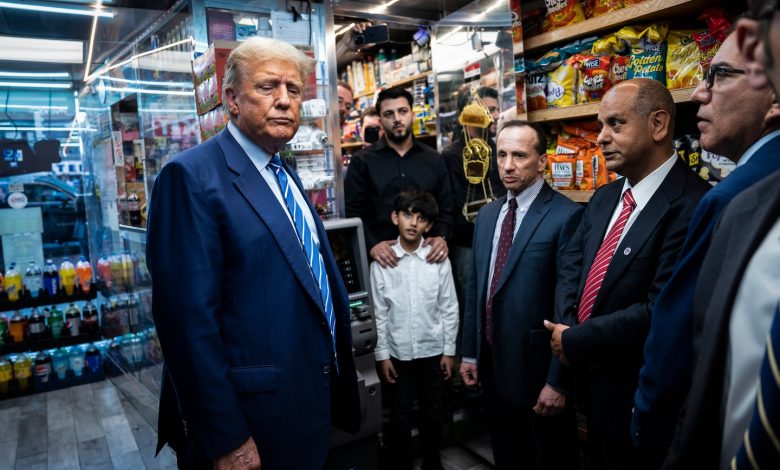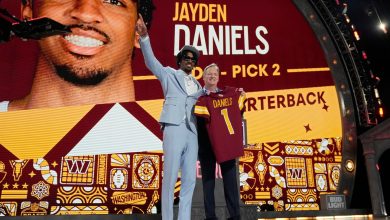The Trump GOP’s inverted perception of crime in America

“Everything is screwed up in New York, and the whole world is watching,” Trump insisted while speaking to reporters. In his case, he added, “there’s no crime. You know where the crime is? In the bodegas, where they come and rob them every week.” As is his recent habit, he included a separate excoriation of recently arrived immigrants, who, he insisted, were taking all the jobs and who were “prisoners and people from mental institutions, largely.”
Viewed through a sympathetic lens, you see what Trump is arguing: They’re coming after me when there’s real crime out there? Step back one degree from that sympathetic view, though, and you come to a more useful position: Rather than being assessed on a sliding scale, crimes should generally be subject to accountability.
For years, Trump has offered his base a bifurcated view of law enforcement. Local police are lionized, both as a statement of allegiance and as the thin blue line keeping America safe from salivating hordes of leftist rioters, urban criminals and immigrant savages. Federal law enforcement, though, is suspect and corrupt, a position intertwined with long-standing investigations into Trump at the federal level. With his indictments at the local level in Georgia and Manhattan, Trump simply tied the local district attorneys back to his federal political opponents. (“By the way, this trial that I have now?” he said at the bodega. “That’s a Biden trial.”)
At the moment, though, this divergent view of crime — Trump and his allies are innocent political targets while liberal prosecutors let other criminals slide — is more distant from reality than usual.
Crime, by most available metrics, is down in recent years. That includes homicides, which, as the Wall Street Journal reported this week, have dropped sharply in several cities. In New York City, violent crime is down 3 percent year-to-date. Grand larceny is similarly down 3 percent, though the number of robberies is up 4 percent.
But it is an election year, so, as was the case in 2020 and 2022, warnings from Trump and his allies about criminal activity are omnipresent and breathless.
“The next six months is going to be intense,” Kari Lake, a Republican candidate for Senate in Arizona, said at a rally over the weekend, as the New York Times reported. She told listeners to get ready: “We are going to put on the armor of God. And maybe strap on a Glock on the side of us just in case.”
The New York Post — a perpetual engine of fearmongering about crime — reported that “Californians are buying up guns after Border Patrol starts dumping thousands of migrants on streets.” In March, there were about 131,000 background checks conducted in California, a process that generally precedes a gun sale. Last March there were 128,000; the March before that, 129,000. In March 2021, there were 144,000.
None of this is to say that violent crimes don’t occur; they do. It is, instead, to point out that heightened rhetoric about the dangers of crime doesn’t comport with the reality of trends in crime data.
This rhetoric sits alongside a willingness to give Trump and his allies a pass. Polling from the Associated Press, conducted by NORC this month, shows that only a small fraction of Republicans think Trump did anything illegal concerning the four indictments he faces. Only 6 percent of Republicans think he did anything illegal in the New York case.
This idea that Trump is being unfairly targeted for scrutiny and sanction — an idea Trump has relentlessly promoted for obvious reasons — extends to his allies. On Tuesday night, Newsmax host Greg Kelly (son of the former commissioner of the New York Police Department) encouraged viewers to write to former Trump adviser Peter Navarro, imprisoned in Florida.
Let’s all WRITE Peter Navarro. He’s in JAIL and that’s a TOTAL CRIME. Send him a note! (Message: We Care!) PS: No contraband. pic.twitter.com/QSPjxcAAXK
— Greg Kelly (@gregkellyusa) April 17, 2024
“He’s in JAIL and that’s a TOTAL CRIME,” Kelly wrote on social media on Wednesday morning. The reality is that Navarro ignored a congressional subpoena and was found guilty of contempt of Congress.
But Navarro was just stonewalling the House select committee investigating the Jan. 6, 2021, attack on the U.S. Capitol, hardly something a Trump supporter is going to be overly worried about. Likewise the actions of Trump: Oh, he tried to block Joe Biden’s presidency? Why not focus on the real criminals?
It’s all about how the criminal actions are perceived. Trump keeping classified documents gets a shrug, but the specter of tattooed immigrants lying in wait in the dingy streets of New York is indelible. That the former happened and the latter is wildly overheated is neither here nor there. They are the bad guys, not us. They deserve to be cracked down on, to be constrained or punished. Not us. They are the ones we should be worried about.
In Kari Lake’s world, you’re advised to walk down the street armed and with your head on a swivel before you arrive at the courthouse to support Donald Trump during his criminal trial.
Apsny News English



